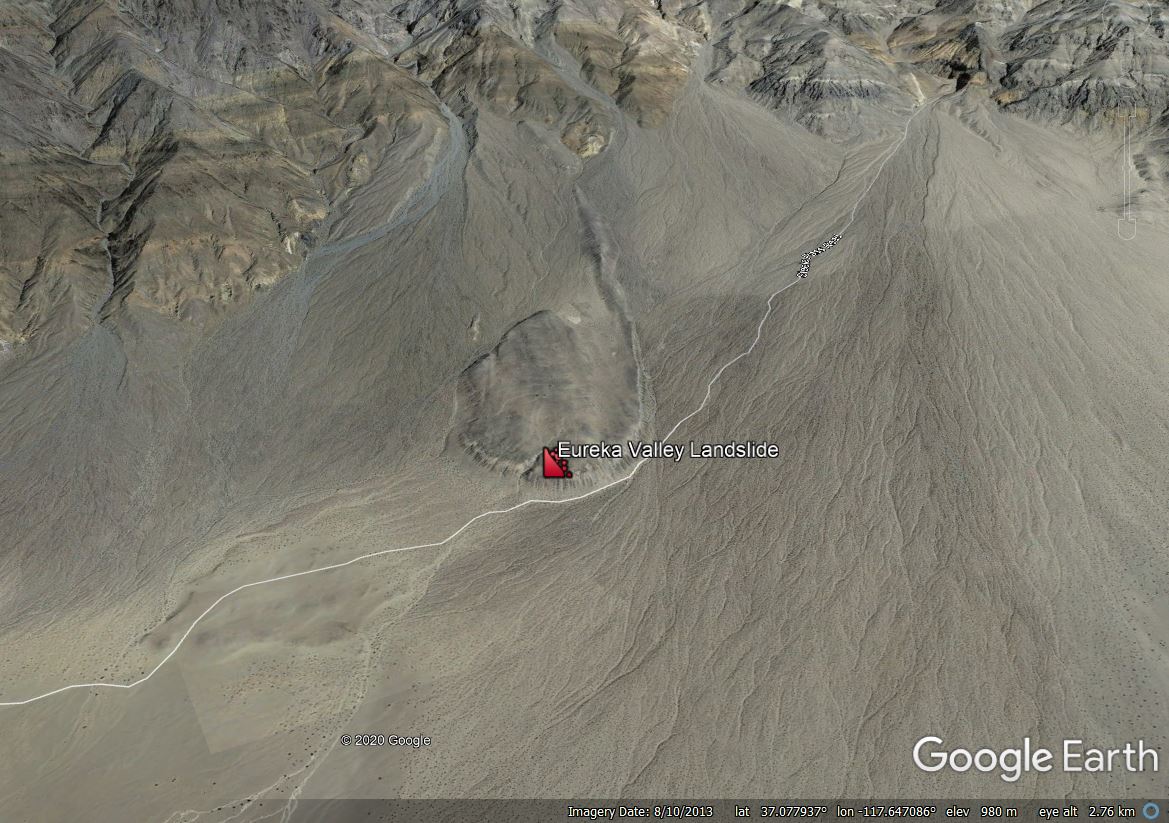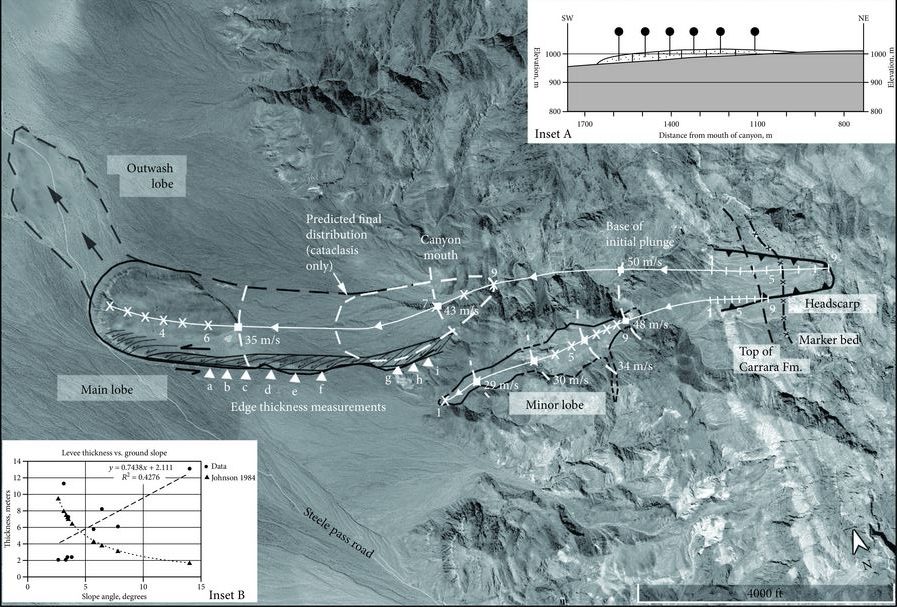14 December 2020
The Eureka Valley Landslide in Death Valley National Park
Posted by Dave Petley
The Eureka Valley Landslide in Death Valley National Park
Way back in the mists of time, when this blog was fresh-faced, I wrote a brief piece about a very intriguing landslide in Death Valley National Park. This feature, known as the Eureka Valley Landslide, is the beautifully-preserved preserved remains of an ancient long runout failure. It is very clear on Google Earth:-

Google Earth image of the Eureka Valley landslide in Death Valley National Park, California
.
I have placed the marker at the toe of the main lobe of the landslide, which is located at 37.076, -117.652. Note however that there is another lobe downslope of this point with a slightly different orientation – this is interpreted as being an outwash lobe. The runout distance for the main lobe is about 3.5 km.
This landslide has just been described in a new paper published in the journal Lithosphere (Shaller et al. 2020). Many thanks to the authors for highlighting it to me. The authors have found that the landslide started with 5 million cubic metre detachment up in the steep terrain. The authors tentatively suggest that the landslide occurred about 100,000 years ago.
The most interesting aspect of this study is the detailed sedimentology undertaken by the authors, which has allowed them to construct an interpretation of the likely movement mechanisms. In the early part of its movement, through the canyon system in the mountains, they suggest a “cataclasis mechanism” involving rock fragmentation and energy recycling. However, once out of the rugged terrain they suggest that the mechanism transitioned to a sliding mechanism enabled by liquefaction of the alluvium over which the landslide was moving. The image below provides a full overview of the landslide:-

An interpretation of the Eureka Valley landslide. Figure from Shaller et al. (2020).
.
In broad terms this feels a bit like the change in mechanism that is seem in the Mount Dixon rock avalanche video, where the landslide transitioned from an avalanche phase into sliding, in that case over ice.
There is a huge amount of rich detail in the paper – it is worth a read.
Reference
Shaller, P.J., Doroudian, M. and Hart, M.W. 2020. The Eureka Valley Landslide: Evidence of a Dual Failure Mechanism for a Long-Runout Landslide. Lithosphere 2020 (1), 1–26. doi: https://doi.org/10.2113/2020/8860819


 Dave Petley is the Vice-Chancellor of the University of Hull in the United Kingdom. His blog provides commentary and analysis of landslide events occurring worldwide, including the landslides themselves, latest research, and conferences and meetings.
Dave Petley is the Vice-Chancellor of the University of Hull in the United Kingdom. His blog provides commentary and analysis of landslide events occurring worldwide, including the landslides themselves, latest research, and conferences and meetings.
Thank you for bringing this feature, and the paper, to our attention!
Thank you for highlighting our paper on your blog. I’m very glad to know that you found it if interest!
Thank you for highlighting our paper on your blog. I am very glad to know that you found it of interest!
Dave-
The Eureka Valley Landslide in Death Valley National Park was first brought to my attention in December 2008 by Michael W. Hart, an engineering geologist in San Diego who has extensively studied and investigated landslides, in southern California and elsewhere. Mike Hart took me, Phil Shaller and Brian Olson to visit what he called the “Eureka Valley Landslide”, which he thought might be a long runout landslide. At about the same time, we visited the huge Tin Mountain Landslide located along the dirt road between Ubehebe Crater (a volcanic crater to the north) and The Racetrack (a playa lake to the south, which was famous for its moving stones on the playa surface). The main part of the Tin Mountain Landslide (approximately 5-miles by 2-miles in lateral dimension) also appeared be a long runout landslide. The Tin Mountain Landslide was previously mapped by USGS geologists (B.C. Burchfiel, 1966; and M.C. Reisheis, 1991).
Gregory T. Farrand, CEG
Principal Geologist
Ninyo & Moore
San Diego, CA
[email protected]
3-13-25